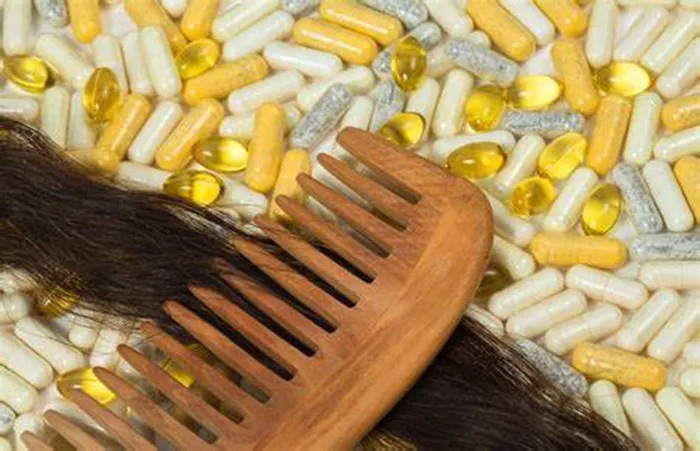The quest for long, lustrous hair remains timeless, despite shifting trends in hairstyles and colors. Hair vitamins, from biotin-infused multivitamins to standalone collagen supplements, claim to accelerate hair growth and enhance its strength and shine. However, dermatologists suggest that the efficacy of these vitamins hinges on their ingredients.
Dr. Dendy Engelman, a board-certified dermatologist, notes that hair vitamins often include a blend of biotin, vitamin B, vitamin D, and keratin. Yet, the question remains: do these supplements actually work?
Ingredients Matter
Dr. Mamina Turegano, a triple board-certified dermatologist, internist, and dermatopathologist, emphasizes that the effectiveness of hair vitamins largely depends on their components. She advocates for personalized consultations with dermatologists or trichologists to address hair health issues. “Hair loss is a complex condition, and determining the underlying cause is crucial. Certain supplements might be more beneficial than others depending on the specific type of hair loss,” she explains.
Understanding Hair Growth Phases
To grasp how hair vitamins might support hair growth, it’s essential to understand the hair growth cycle, which consists of four stages:
1. Anagen Phase: This active growth phase lasts between two to seven years, depending on genetics, age, and hair location. During this period, hair grows about one centimeter per month. Approximately 85-90% of scalp hairs are in this phase at any given time.
2. Catagen Phase: Known as the transitional phase, this lasts two to three weeks. The hair follicle shrinks and detaches from the dermal papilla, reducing nutrient supply to the hair.
3. Telogen Phase: In this resting phase, the hair follicle remains dormant and stops producing new cells. This phase lasts around three to four months.
4. Exogen Phase: The shedding phase allows for new hair growth. At any time, about 10-15% of scalp hairs are in this phase.
Key Ingredients for Hair Health
Experts highlight several ingredients that are commonly included in hair vitamins for their potential benefits:
Biotin: This vitamin B7 derivative aids in keratin production, which strengthens hair and reduces breakage. However, its effectiveness is still debated, and high doses can affect lab test results.
Niacinamide: Known for improving blood circulation to hair follicles, this B3 derivative can enhance hair texture and promote growth.
Collagen: As a key component of hair follicles, collagen can strengthen hair and prevent breakage. Hydrolyzed marine collagen peptides are particularly recommended for their benefits in improving hair density and scalp hydration.
Vitamin A: While it promotes cell turnover and keeps hair follicles healthy, excessive vitamin A can cause hair shedding by disrupting the hair growth cycle.
Vitamin C: Essential for collagen production, vitamin C strengthens hair and improves its structure.
Vitamin E: With antioxidant properties, vitamin E enhances blood circulation to the scalp, ensuring hair follicles receive essential nutrients.
Keratin: This protein is fundamental for hair structure and strength.
Saw Palmetto: Effective in reducing dihydrotestosterone (DHT), which is linked to hair thinning and androgenetic alopecia.
Zinc: This mineral supports hair follicle recovery and structural integrity.
MSM (Methylsulfonylmethane): Contains sulfur, which is vital for hair cartilage and collagen production.
Adaptogens: Ingredients like ashwagandha and shatavari help balance stress hormones, supporting a healthy hair growth cycle.
Turmeric: Curcumin, found in turmeric, is a potent antioxidant that addresses various causes of hair thinning.
Vitamin D: Plays a role in keratinocyte differentiation and proliferation. Though its effectiveness in hair regrowth is debated, it’s beneficial for those with deficiencies.
Additional Considerations
Hair vitamins might not be a universal solution. It’s crucial to evaluate whether you have sufficient levels of these vitamins in your diet or if you have any deficiencies. Dr. Gina Ashworth warns against self-medicating with supplements, stressing the importance of diagnosing any underlying conditions that may contribute to hair loss.
Dr. Turegano recommends a comprehensive approach, including medical history review, physical exams, and lab tests to identify deficiencies or imbalances. Consulting a dermatologist for an evidence-based plan tailored to individual needs is advisable.
Conclusion
Hair vitamins can potentially support overall hair health, particularly for individuals with specific deficiencies. However, the best approach is to seek professional guidance to accurately diagnose and address the root causes of hair loss, rather than relying solely on supplements.
[inline_related_posts title=”You Might Be Interested In” title_align=”left” style=”list” number=”6″ align=”none” ids=”12196,12220,12216″ by=”categories” orderby=”rand” order=”DESC” hide_thumb=”no” thumb_right=”no” views=”no” date=”yes” grid_columns=”2″ post_type=”” tax=””]


































